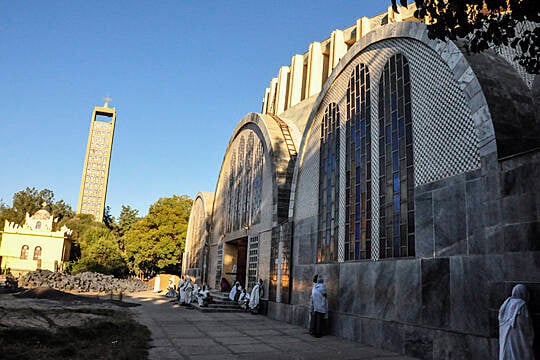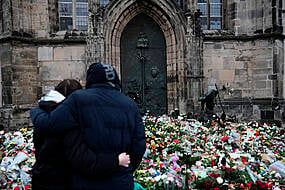Soldiers from Eritrea systematically killed “many hundreds” of people in a massacre in the Ethiopian holy city of Axum, Amnesty International has said.
The head of the government-established Ethiopian Human Rights Commission, Daniel Bekele, said the Amnesty findings “should be taken very seriously”.
The commission has said its own preliminary findings “indicate the killing of an as yet unknown number of civilians by Eritrean soldiers” in Axum.
The Amnesty report on what might be the deadliest massacre of Ethiopia’s Tigray conflict describes the soldiers gunning down civilians as they fled, lining up men and shooting them in the back, rounding up “hundreds, if not thousands” of men for beatings and refusing to allow those grieving to bury the dead.

Over a period of about 24 hours, “Eritrean soldiers deliberately shot civilians on the street and carried out systematic house-to-house searches, extrajudicially executing men and boys”, the report released on Friday says.
“The massacre was carried out in retaliation for an earlier attack by a small number of local militiamen, joined by local residents armed with sticks and stones.”
The “mass execution” of Axum civilians by Eritrean troops may amount to crimes against humanity, the report says, and it calls for a United Nations-led international investigation and full access to Tigray for human rights groups, journalists and humanitarian workers.
The region has been largely cut off since fighting began in early November.
Ethiopia’s federal government has denied the presence of soldiers from neighbouring Eritrea, long an enemy of the Tigray region’s now-fugitive leaders, and Eritrea’s government dismissed an AP story on the the Axum massacre as “outrageous lies”.
Eritrea’s information minister Yemane Gebremeskel on Friday said his country “is outraged and categorically rejects the preposterous accusations” in the Amnesty report.
But even senior members of the Ethiopia-appointed interim government in Tigray have acknowledged the Eritrean soldiers’ presence and allegations of widespread looting and killing.

On Thursday, Ethiopia’s government acknowledged that the Ethiopian Human Rights Commission was investigating “allegations relating to incidents in the city of Axum” in collaboration with unnamed international experts.
But Ethiopia’s ambassador to Belgium, Hirut Zemene, told a webinar on Thursday that the alleged massacre in November was a “very highly unlikely scenario” and “we suspect it’s a very, very crazy idea”.
No one knows how many thousands of civilians have been killed in the conflict between Ethiopian and allied forces and those of the Tigray regional government, which had long dominated Ethiopia’s government before Prime Minister Abiy Ahmed took office in 2018.
Humanitarian officials have warned that a growing number of people might be starving to death as access, while improving, remains restricted.
The United States has repeatedly urged Eritrea to withdraw its soldiers and cited credible reports of “grave” human rights abuses.
Witnesses of the massacre in Axum told Amnesty International that Ethiopian and Eritrean soldiers jointly took control of the city but the Eritreans carried out the killings and then conducted house-to-house raids for men and teenage boys.
Bodies were left strewn in the streets after the events of November 28 and 29, witnesses said.
“The next day, they did not allow us to pick the dead. The Eritrean soldiers said you cannot bury the dead before our dead soldiers are buried,” one woman told Amnesty International.







